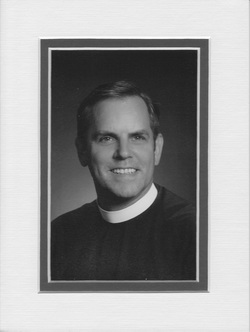 Day 43: Monday, February 18, 2013 Readings: Leviticus 16-18, Psalm 36, and Mark 9
Today in the cycle of our current Church year, we are entering the first full week of Lent. Many churches begin this season with the Great Litany, which offers us one way to confront ourselves with the comprehensive way that sin permeates our lives – corporately and individually. In our Lenten journey, we reflect seriously on our faults and seek to amend our lives in order to become more whole for the glory of God and the welfare of the world.
Thus it is interesting to read about the annual rites the ancient Israelites observed in order to bridge the chasm that sin had created between them and God. As I read the specific details, I think Altar Guild members must be cringing at all that blood intentionally hurled at cloth in the liturgy! Today’s descendants of Israel observe the Day of Atonement in a more domestic fashion, focusing on repentance and amendment of life without shedding blood or releasing the scapegoat into the wilderness to fend for himself.
Our challenge is to repent sincerely and to amend well. Psalm 36 reminds us that we are vulnerable in this process to noticing the sins of others, just to feel better about ourselves. We hope that God will treat us better than those n’er-do-wells because of our efforts to reform, meager as they may be. The beautiful center of this psalm describes God’s eternal faithfulness and care. As we wrestle with the sin around us and within us, we need to remember God’s character of generous provision and faithful love.
Jesus’ Transfiguration before Peter, James and John – his chief confidants among the Disciples –is a crucial vision for these clueless mortals at a pivotal point in Jesus’ ministry. They are on their way to Jerusalem. When Jesus reunites with all his followers, he explains that he will suffer and die and will rise again, a turn of phrase that naturally bewilders his companions. We understand that Jesus surrendered his life on behalf of us, like the animals who served as purification offerings in the Levitical code. The vision of Jesus’ body glowing with heavenly glory and his predictions of the suffering to come will offer comfort to Jesus’ disciples in those dark Jerusalem days. Meanwhile, Jesus makes the most of the remaining hours of his ministry – healing and teaching, leaving new life in his wake.
We have the precious opportunity to stay alert to the darkness and pain in our world and to respond in our own way as God’s servants, leaving new life in our wake.
The Rev. Jennie Lou D. Reid+
Rector, St. Faith’s Episcopal Church, Cutler Bay, Florida
 As we read Leviticus 15, Psalm 35 and Mark 8, we wonder what do these passages from scripture have in common, may I submit that even if the revelation seems to be misapprehended, the message is constant, “God is doing something” to restore, cleanse and renew. We are called to strive for the best in spite of the fact that we will often stumble. Must we call on God to utterly destroy our enemies? No, yet we can appreciate the reaction of the oppressed whose only hope is in God who will ultimately deliver the faithful servants as expressed in Psalm 35. The servants puts his trust in God, who is just and faithful. It is this faithfulness in God that brings Peter to confess what matters most, “You are the messiah.” It is therefore about total submission to God’s will, being ready to take up our cross and follow him.
To be clean as Leviticus demands, to trust as Psalm35 instructs us, to save our life as stated in Mark 8:35 is what is so well expressed in that beautiful hymn, “Where he leads me, I will follows.” (Lift Every Voice and Sing, hymn # 144.)
The Ven. Dr. J. Fritz Bazin
Archdeacon for Immigration and Social Justice
 Bible Challenge Day 40
Leviticus 10-12; Psalm 34; Mark 7
The juxtaposition of today’s readings from Leviticus and Mark is a striking one.
The three chapters of Leviticus continue the teaching around issues of religious purity and holiness starting with the sobering story of the two sons of Aaron, Nadab and Abihu, who chose the wrong, “profane” fire for the daily burning of the incense. In retaliation, the holy fire of the Lord consumes them. The text is not explicit as to whether this was an innocent mistake or a matter of slovenly inattention to detail on the part of the sons of Aaron. I suspect the latter. Either way, the message from Leviticus is clear: God takes these traditions and practices seriously. Our reading also spelled out the rules distinguishing clean and unclean foods. I wondered, I hope not too irreverently, about the divine thinking behind allowing grasshoppers on the kosher menu but not beetles.
In Mark chapter 7 Jesus speaks directly to the issues of purity and holiness before God. The chapter begins with a reverse pilgrimage. In Jesus’ day the people of God would regularly make pilgrimages to Jerusalem to worship at the temple. The pattern is now reversed. The religious leaders are making a pilgrimage from Jerusalem to Jesus. Although they do not acknowledge it, Jesus is the new temple, the place where the human and divine meet in perfect communion. They come to Jesus as the proud bearers of the traditions of Leviticus and their topic is ritual purity and the fracturing of the traditions by Jesus’ disciples. (Note that Jesus is not directly accused, just the disciples, which suggests a slyly indirect accusation of Jesus’ authority). They are full of righteous, holy fire and appear more than prepared to torch Jesus and the disciples.
Jesus responds to this challenge by clarifying the meaning and interpretation of the Levitical teaching on purity. God is not interested in tradition for tradition’s sake, particularly when tradition is embellished or subverted with human, as opposed to God-driven, “add ons”. Purity is not about an impressive outward religious performance. Instead, God is interested on what’s going on inside us; God is interested in the disposition of our heart. It’s from the heart – for Jesus the center of our very selves, not just our emotional life – that either defilement or purity flows.
As we read and meditate on these chapters in Lent, here are some questions to ponder in this season of honest self-examination and grace-led repentance. Do our hearts belong to God? And as for that consuming fire in Leviticus, what does God’s holy fire need to consume in us that we might be made pure and holy, a living sacrifice to God?
The Rev. Andrew J. Sherman, Rector
St. Gregory’s Episcopal Church, Boca Raton
 Daily Reflection for February 14 or Day 39
Daily Blog – Day 39 Leviticus 7-9, Psalm 33, Mark 6
Much of what we hear in our readings today involves how we as individuals or as a faith community are prepared to be vehicles of God’s mercy and grace. In other words, how do we deliver God to God’s people? The reality of our ministries is that the majority of our efforts are heavily focused on preparing the recipients, those who are to receive God, and not on how we are prepared. As we review from Leviticus the lengthy process of how Aaron was prepared to be ready to be a leader and channel for God’s grace for the people (which by the way took seven days to do), we must also note that on the eighth day he had to prepare himself.
How do we prepare ourselves? As we enter now into the season of Lent, it is most appropriate to examine ourselves and become more mindful not only of our relationship with our Lord, but of our representation of Him as we are privileged to give Him to this broken and selfish world. The offering of ourselves involves an emptying of our ways and desires. It is to offer God our humble and contrite hearts. As is witnessed by Mark’s sixth chapter, the disciples put themselves in a position of service for God by obedience and self-denial, an emptying and humbly of themselves. It is such a contrast to the work and testimony of Aaron.
William Barclay wrote that the mark of true discipleship is “utter simplicity, complete trust and the generosity which is out always to give and never to demand.”* Through the gift of grace we all have received in Holy Baptism, we are called and empowered to be vehicles of God’s mercy, love and grace for the world. Are we obstacles to that grace? Or are we truly offering ourselves, our hearts and our lives, up to God? It is something most worthy of our prayer and meditation as we begin Lent.
The Very Rev. Dr. William L. Stomski, Chaplain and Sacred Studies Educator, Saint Joseph’s Episcopal School, Boynton Beach Dean of the Diocesan School for Christian Studies
*Barclay, William. The Gospel of Mark: The New Daily Study Bible (London: Westminster John Knox Press, 2001), 166.
 Bible Challenge
Clergy Meditation
February 13, 2012
Ash Wednesday
Reflection: Mark 5-Ash Wednesday
This reflection is written for all, but especially for our clergy as we enter into the Season of Lent.
Events of worthy note create emails that find their way to our inbox. The more attention-grabbing the topic the more our inbox is filled with thoughts, opinions and questions. That is until the incident fades in the memories of those who thought it significant. Eventually the emails are either discarded or saved. I saved the many emails collected after my mother-in-law’s death this past July.
It may be a big stretch to employ the email as a metaphor to the role of Jesus in our lives. But, let’s stretch for a moment. It’s good for the posture. It’s good for the soul.
Aren’t our thoughts and even our hearts afire when a miraculous act of Grace happens in our lives, or the lives off those we love and serve? When ministry is overflowing with much success and when life is good at home and in the parish, we are well pleased and give thanks and praise to the One who has enabled it all. “Yeah, Jesus!” is our voice of praise.
We observe in Mark, Chapter 5, Jesus healing the man with a very bad case of demonic possession, a dad who deeply feared the death of his beloved daughter, and a woman who was so ill from hemorrhaging that she found her last hope in the touch of a garment worn by a man she didn’t know. It is likely that we each have ministered to folks suffering from similar agonies. If they were healed, “Yeah, Jesus!” was their shout of joy. But, how long did they continue their desire to follow their Healer? For most, until the event of the restoration was soon a distant recollection and their praise a faint emotion. Rather like the emails that find their way into the user’s trash box.
The Gospel from this First Sunday in Lent puts “email theology” into right perspective, I think. Jesus, full of the Holy Spirit, goes into the wilderness to test his love of the Father. Talking about “hot news”, Jesus was promised the world! This would have been something to email home. It would certainly go viral. Jesus however knew that Satan’s sweet offerings were just a façade, a tickling of the senses and a buttress for a wounded ego seeking purpose. Eventually, they would loose their significance, returning to the dust from which they were fashioned. The perennial delete delete.
The earthly focus of Jesus was the intimacy of the Love relationship from which He came and whose purpose it was for Him to be among us. It is this same love of God who calls us each by name and who has set us aside to be leaders in Christ’s Church. We have said “Yes” and taken upon ourselves a really tough job. We’re sales representatives for the Person whose lifestyle was perfectly committed to the will of Divine Love. We are charged to point the way beyond the sensational, beyond the trappings, beyond the self-serving interests of our desires and to the Loving heart of God who is eternal and “non-deletable”.
I’m confident we are all prepared for Lent. During this Season it is good to remember that God, usually, does not come to us in exciting occurrences such as a great and strong wind, an earthquake, or even a fire. Rather, he often comes to us in a still small voice. (IKings19:11) As Lent leads into Easter it will demand so much of the sensational from us. My hope is we each remember to daily be with Jesus in the quietness of our closet. It is from this spiritually, grounded relationship that you and I are empowered to point the way to Jesus.
It is my personal desire that the Season of Lent serve as a framework to deepen the spiritual journey into the Heart of Christ for those I serve and myself. Joel and Matthew our assigned readings for today suggest a path inward. Their guidelines are to pray, fast, repent, mourn and weep. Seriously think about how each of these suggested “sites” will lead us into the Heart of Christ. At first glance most persons would not want to click on them: not very sensational. However, if we enter into one or more with a prayerful and faithful heart… their benefit is worth saving for eternity.
May you and yours have a holy and fruitful Lent.
The Reverend Bernard J. Pecaro
St. Martin, Pompano Beach
 Reflection for Day 37
So our journey in the Bible Challenge has brought us
to Leviticus, considered by some to be a daunting obstacle when it comes to a disciplined reading of the Bible. For many, all the details, often bloody and grisly, of sacrificial worship can tempt us to skip over this section, or worse, just put the Bible down. Do not do it.
Reading these first three chapters of Leviticus brought two thoughts to mind. The first is “inside baseball”. For those unfamiliar with this term, “inside baseball” refers to a joyous cherishing of the obscure, details of the rules and practices of baseball both written and unwritten. Inside baseball takes pleasure in comparing the subtle differences of how every batter holds the bat or the different gyrations each pitcher goes through in delivering the pitch. For the uninitiated, this might seem pointless, purposeless and as boring as watching paint dry. For others, however, a meditation on these details yields an appreciation for the craftsmanship of the players and their desire for excellence and achievement on the field of play.
There is an “inside baseball” feel to Leviticus with its careful, detailed attention to the rules and regulations of worship that can seem a bit numbing and pointless. But it strikes me that this level of interest in the details of sacrificial worship emphasizes a desire for excellence in worship. These details matter because God matters. This is holy work because God is holy. Worship, done reverently, with a careful attention to details, expresses this importance. Perhaps if we read these chapters sacramentally, that is if we see beyond the outwardly strange and unfamiliar practices of the form worship described, we can begin to see the inward grace of a profoundly holy desire to get our relationship with God right.
This led to my second thought which is an appreciation for the work of our Altar Guilds. In every congregation, there is a dedicated corps of people who help prepare the people of God for worship. They care about the details of how linen is cleaned, ironed and folded. They are experts in polish and how to remove the sometimes bloody red stain of lipstick off the rims of chalices and purificators. For every altar guild member, I hope there is an experience of the holy presence of God in those quiet moments, working alone or in small teams, making sure the holy people of God get all the details of preparation and worship right. These details matter because God’s holy
life-giving presence matters. Leviticus teaches us this truth.
The Rev. Andrew J. Sherman
St. Gregory’s Episcopal Church, Boca Raton
 Monday, February 11, 2013 Day 36 – Exodus 40, Psalm 30, Mark 3
First, if you have not already done so, please take a look at the visual representation of the last few chapter:
http://visualunit.files.wordpress.com/2011/07/ex_tabernacle.jpg. It is helpful to see a pictorial description of the tabernacle, and what is in it.
Now we shift gears to beginnings and endings. Beginnings and endings are particularly important both in life, and in the Bible. Today's Mark reading is towards the beginning of the book but already Jesus is knee deep in miracles and teachings. In only the third chapter, healing and teaching have become the norm for our Savior. The implication is that God is immediate. There is no time wasted with back-story. It is all about the immediate power of God. The Good News can is that God is immediate to us too.
Exodus also show the close presence of God. God is right there in the cloud, in the fire, in the tabernacle. The ending of Exodus illustrates that God is "before the eyes of all the house of Israel". God is at hand with them. Exodus ends with a lot of uncertainties, but it also end with God presence.
Finally, notice the very last word the Book of Exodus. In almost every translation, the last word is "journey" or "travels". The word journey is a fairly good description for what is to come. In fact, the first five books of the Bible all end with a word that is a good description of what is to follow.
Genesis - Egypt
Exodus - Journey
Leviticus - Mount Sinai
Numbers - Jericho
Deuteronomy - Israel
At the end of Exodus it is indicated that the Journey is just beginning.
Enjoy the journey and keep reading!
The Rev. Spencer B. Potter, St Andrew's Episcopal Church, Palmetto Bay
 Daily Blog. Day 34 -- Exodus 37 - 39; Psalm 29; Mark 2
“Ascribe to the Lord the glory of his name; worship the Lord in holy splendor.”
Over the past few chapters of Exodus we have read of how the people of God gave freely of their possessions to the work of the worship of the Lord. In our chapters for today we read of the work of Bezalel a skilled and most importantly an inspired craftsman in a step by step method, not only leaving us in awe of his craftsmanship but also giving us a vision of the ‘Holy Splendor’ in the creation of the liturgical constructs and elements which will become integral in the lives of God’s people into the future. These may sound overly extravagant to our ears today, but to these, who are just beginning to find expression for ‘God in their midst,’ this is their way. Throughout history we find the people of God wrestling with these desires to prepare special sites and worship patterns to celebrate the Lord in ‘holy splendor.’ We have crafted great awesome cathedrals and monasteries, elaborate vestments, and jeweled utensils; all expressions of our awesomeness of God’s presence.
Though God is obviously not in need in any of this, it becomes our need, our expression of the glory of God’s name. As God comes to us in the incarnation of Jesus, we see God’s naked simpleness. Jesus is presented in Mark’s Gospel as humble servant, a brother without flash and fanfare. Though God inspires craftsman to enliven our senses it is the crafting of our hearts, each and every heart, which is most important. We find Jesus in today’s reading located in a simple home with a thatched roof. Far from the Splendor we read of Bezalel’s work, Jesus is in the midst of God’s people working on their hearts. Jesus demonstrates that the most crucial element in one’s heart renewal or repair, is forgiveness.
To the surprise of all, following the dedication, devotion and hard work of the friends of the paralyzed man to dig their way through the roof, lowering their friend into God’s presence, Jesus forgives his sins -- repairs his heart. The ‘holy splendor’ of the Lord extends to our own being – we are God’s creation and part of his holy splendor. Jesus draws us to our own fullness more important to God than any Cathedral, and begins with our hearts. And oh, if we, like the some of the scribes, have fears and doubts, Jesus asks, “which is easier…?”
The Ven. Thomas Bruttell, Archdeacon for Deployment
The Episcopal Diocese of Southeast Florida
 Day 33
Exodus 34-36, Psalm 28, Mark 1
The Law had been given. The Covenant was accepted. The tabernacle was designed. A plan for the ark was created. The priests were dedicated. All was written in stone by God and given to Moses. And then human beings acted like we human beings do, at times. We became impatient and self-important waiting so long for our leader to return from the mountaintop from his meeting with God. We doubted and settled for material wealth to worship instead of God Almighty. And when Moses saw us worshiping our golden calf he was furious. The next day when he calmed down he had compassion for his people and would return to God on behalf of them once more. And though God’s people were punished, God, in his mercy forgave.
A second chance… written in stone.
And the psalmist says, “Hear me. The Lord is my strength and my shield; in him my heart trusts; so I am helped and my heart exults, and with my song I give thanks to him.”
And we begin anew (again, and again and again). We are guided now by Mark, a messenger of good news, to follow this man Jesus, and we are miraculously healed as we do.
My sisters and brothers in Christ, in the trials and joys of our lives, may we have the wisdom to be able to begin again whenever we need to do so; to realize when we go astray; to ask for forgiveness and forgive one another; and to accept the love of God deep in our souls. “The Lord is my strength and my shield; in him my heart trusts; so I am helped and my heart exults, and with my song I give thanks to him.”
Rev. Wendy Tobias
Associate Priest
St. Joseph’s Episcopal Church

Day 32 – Exodus 31-33
A More Convenient “Truth”
In the reading for this 32nd day of the Bible Challenge, here in the Diocese of Southeast Florida, we are presented with readings from Exodus 31-33. The appointed selection begins with Moses receiving his final directives from the Lord on how he is to establish the Law that would become the foundation for the people of Israel. The selection ends with Moses ordering the slaughter of those who disobeyed the will of God!
The largest section of this selection from Exodus is Chapter 32. Folk may be familiar with this passage, as this is where the people of Israel coerce Aaron to build them a golden calf. The people found themselves in the wilderness, and their leader had been delayed in returning. They found themselves in a confusing place, and their guide was not with them.
In their anxiety and lack of patience, they commanded Aaron to make a “god” for them to worship. Aaron capitulates, takes gold from the people, and constructs the golden calf. This is just what the people want, and they are in a euphoric state. Aaron is elated that he has quelled the complaints of the people – so pleased with himself that he proclaims the next day to be “a festival to the Lord!”
But this is not what the people need. In the wake of the dancing and feasting of the people, God sends Moses with haste to the people. The Lord is ready to destroy the people for their idolatry. Yet, Moses begs for the people and spares them God’s wrath. Upon seeing the scene firsthand and hearing of Aaron’s capitulation (Ex. 32:19-26), Moses loses his own cool and instructs the Levites to “kill everyone.” Three thousand people died that day.
In analysis of this passage, we find the people seeking a more convenient “truth” than the God of their salvation. With Moses being on Sinai for such a long time, the people felt absent from God. Rather than wait on the Lord, the people took matters into their own hands and literally made God in their own image.
Think: a people who God had made in His own image and who God had liberated and redeemed, endeavored to make God in their own image then attempted to confine and profane God by their desires.
The people were searching for a more convenient “truth.” They wanted a god that would respond to them as their servant. They sought a god who would answer to them and adjust himself to suit their needs.
God, through Moses, had instructed them to wait. They grew tired of waiting on a God that was distant to them. They didn’t see the purpose of waiting on and worshiping the God Who they couldn’t see. They wanted something tangible…a “god” that fit in with their human conceptions.
But their desire isn’t too far from our desire. We ourselves are in a confusing place. And, there exists a crisis in leadership that leaves us fending for ourselves. At times, and we see in Society, we try to create God in our own image. We make God – and the Word of God (i.e. Jesus Christ) – relative and situational. We turn the Unconditional Love into a conditional one…we try to make God more convenient for us to obey or ignore.
This reading reminds us that God IS. And, He expects something from us: obedience. We can create God in our own image if we like. But, we will ultimately only be erasing our names from the Lord’s record (Ex. 32:33).
So, rather than seeking a more convenient truth, let us wait on the Truth! Let us not capitulate to our personal and communal anxieties! Let us exercise control and patience! Let us be obedient to God and to His call upon our lives! May God give us the strength to endure and to stand firm in The Way! Amen
|










 RSS Feed
RSS Feed